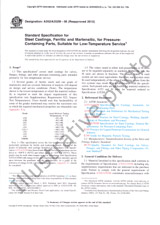We need your consent to use the individual data so that you can see information about your interests, among other things. Click "OK" to give your consent.
ASTM D6469-20
Standard Guide for Microbial Contamination in Fuels and Fuel Systems
Translate name
STANDARD published on 1.9.2020
The information about the standard:
Designation standards: ASTM D6469-20
Note: WITHDRAWN
Publication date standards: 1.9.2020
SKU: NS-1006537
The number of pages: 12
Approximate weight : 36 g (0.08 lbs)
Country: American technical standard
Category: Technical standards ASTM
The category - similar standards:
Annotation of standard text ASTM D6469-20 :
Keywords:
biocides, biodegradation, biodeterioration, biological contamination, contamination, fuel quality, microbial contamination, microbially influenced corrosion, microbiological testing, sampling,, ICS Number Code 27.060.10 (Liquid and solid fuel burners),43.060.40 (Fuel systems)
Additional information
| Significance and Use | ||||||||||||||||||||||||||||||||||||||||||||||||||||||||||||||||||||||||||||||||||||||||||||||||||||||||||||||||||||||||||||
|
5.1 This guide provides information addressing the conditions that lead to fuel microbial contamination and biodegradation and the general characteristics of and strategies for controlling microbial contamination. It compliments and amplifies information provided in Practice D4418 on handling gas-turbine fuels. More detailed information may be found in Guidelines for the Investigation of Microbial Content of Liquid Fuels and for the Implementation of Avoidance and Remedial Strategies, 3rd Ed.,5.2 This guide focuses on microbial contamination in refined petroleum products and product handling systems. Uncontrolled microbial contamination in fuels and fuel systems remains a largely unrecognized but costly problem at all stages of the petroleum industry from crude oil production through fleet operations and consumer use. This guide introduces the fundamental concepts of fuel microbiology and biodeterioration control. 5.3 This guide provides personnel who are responsible for fuel and fuel system stewardship with the background necessary to make informed decisions regarding the possible economic or safety, or both, impact of microbial contamination in their products or systems. |
||||||||||||||||||||||||||||||||||||||||||||||||||||||||||||||||||||||||||||||||||||||||||||||||||||||||||||||||||||||||||||
| 1. Scope | ||||||||||||||||||||||||||||||||||||||||||||||||||||||||||||||||||||||||||||||||||||||||||||||||||||||||||||||||||||||||||||
|
1.1 This guide provides personnel who have a limited microbiological background with an understanding of the symptoms, occurrence, and consequences of chronic microbial contamination. The guide also suggests means for detection and control of microbial contamination in fuels and fuel systems. This guide applies primarily to gasoline, aviation, boiler, industrial gas turbine, diesel, marine, furnace fuels and blend stocks (see Specifications D396, D910, D975, D1655, D2069, D2880, D3699, D4814, D6227, and D6751), and fuel systems. However, the principles discussed herein also apply generally to crude oil and all liquid petroleum fuels. ASTM Manual 472 provides a more detailed treatment of the concepts introduced in this guide; it also provides a compilation of all of the standards referenced herein that are not found in the Annual Book of ASTM Standards, Section Five on Petroleum Products and Lubricants. 1.2 This guide is not a compilation of all of the concepts and terminology used by microbiologists, but it does provide a general understanding of microbial fuel contamination. 1.3 The values stated in SI units are to be regarded as standard. No other units of measurement are included in this standard. 1.4 This standard does not purport to address all of the safety concerns, if any, associated with its use. It is the responsibility of the user of this standard to establish appropriate safety, health, and environmental practices and determine the applicability of regulatory limitations prior to use. 1.5 This international standard was developed in accordance with internationally recognized principles on standardization established in the Decision on Principles for the Development of International Standards, Guides and Recommendations issued by the World Trade Organization Technical Barriers to Trade (TBT) Committee. |
||||||||||||||||||||||||||||||||||||||||||||||||||||||||||||||||||||||||||||||||||||||||||||||||||||||||||||||||||||||||||||
| 2. Referenced Documents | ||||||||||||||||||||||||||||||||||||||||||||||||||||||||||||||||||||||||||||||||||||||||||||||||||||||||||||||||||||||||||||
|
We recommend:
Technical standards updating
Do you want to make sure you use only the valid technical standards?
We can offer you a solution which will provide you a monthly overview concerning the updating of standards which you use.
Would you like to know more? Look at this page.




 Cookies
Cookies
